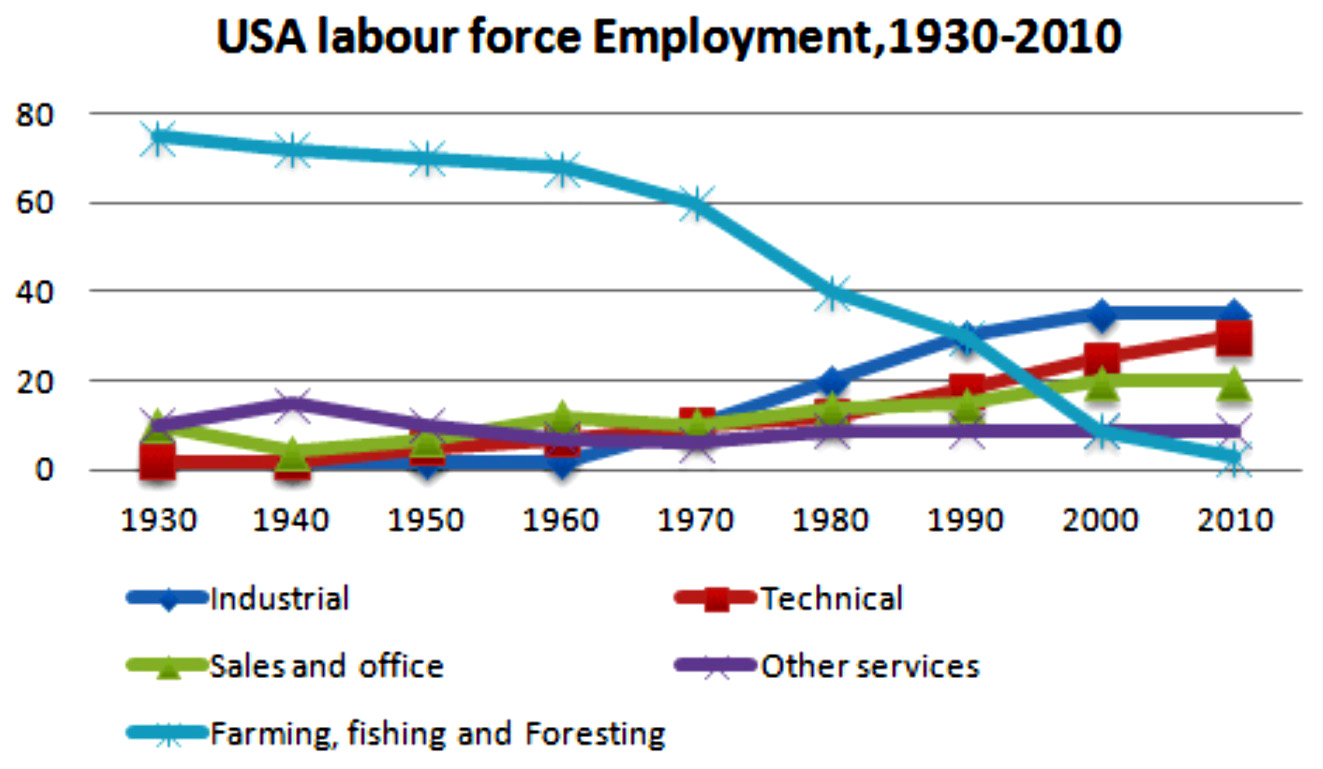The graph below presents the employment patterns in the USA between 1930 and 2010. Summarise the information by selecting and report in the main features, and make comparisons where relevant.
Write at least 150 words.

Some people think that children should start school at a very early age, but others believe that children should go to school until they are older.
Discuss both views and give your opinion.
Give reasons for your answer and include any relevant examples from your own knowledge or experience.
Write at least 250 words.
WRITING TASK 1
In 1930, 75% of the labour force in the USA was employed in farming, fishing and foresting while only 10% worked in sales and office and trade. At the same time both the Industrial sector and the technical sector constituted just 2% of the workforce each. This situation changed only very gradually over the next 20 years, except for the technical workforce, which increased more than threefold.
However by 1980 there had been a significant change in the pattern of employment. While the farming, fishing and foresting employees had declined in number to 40% of the workforce, Industrial employees as well as technical had increased their share to 13% and 10% respectively.
Similarly the sales and office sectors did not increase until 1980. The most dramatic change could be seen by 2000, when the proportion of farming, fishing and foresting works reduced to just 10% while the three other major sectors had all increased to over 20% of the workforce.
(160 words)
WRITING TASK 2
People have different views about whether children should start their formal education as early as possible or delay it until they are older. Personally, I believe an early commencement of study would be far more beneficial than a later start.
Firstly, starting school at a young age would generate a number of positive outcomes. Undeniably, the younger an individual is, the easier it is for them to acquire new knowledge and information. As a result, these children would have a head start over their peers pursuing higher education. Besides this, they would have more opportunity to figure out their natural talents. Most Vietnamese children, for example, are sent to kindergarten at the age of 3 or 4 where they are taught basic skills such as addition and subtraction. After a couple of months, those showing potential will be further cared for by teachers with an aim to train them to become specialized students who can represent their school in national and international competitions in the not-too-distant future.
On the other hand however, several individuals advocate a later start to formal schooling due to a number of reasons. It is believed that commencing school at a later age will offer kids more time to learn many things via their parents at home. As a result, these children will become more mature and integrate more easily into the educational environment in the upcoming years. In addition, it might also be more beneficial for children to have a childhood in which they can cultivate their own skills and interests through normal activities at home.
Personally, I believe that such ideas are flawed because delaying schooling reduces the opportunity for social interaction. Despite being safe with their parents at home, children would have fewer chances to engage in extracurricular activities which would equip them with vital soft skills including teamwork and communication skills. Not to mention, while not at school, many children tend to lead an unhealthy lifestyle as their free time is devoted to online games, which gradually isolate them from society.
(339 words)
